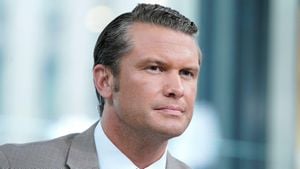The Australian Labor Party is facing sharp criticism for its lack of clarity surrounding the country's climate goals, particularly its 2035 emission targets. Prime Minister Anthony Albanese has indicated these targets will not be disclosed until sometime next year, leaving many, including opposition leaders and environmental groups, questioning the government's commitment to climate action.
During an appearance on ABC's Insiders, Albanese reiterated, "Our focus is on achieving the 2030 target because 2030 is before 2035." This comment came amid mounting pressure as Australia prepares for the upcoming COP29 climate summit, where global leaders are expected to showcase their commitments to combat climate change.
Labor’s existing target aims for a 43% reduction in emissions by 2030. Notably, the United Kingdom recently announced its own ambitious 2035 goal of cutting emissions by 81% compared to 1990 levels, along with a ban on new coal mining licenses, putting pressure on Australia to match similar commitments.
While Albanese's government has previously promised to publish Australia’s climate targets by February 2024, there are now signals this deadline may be pushed back until after the next federal election, scheduled for the first half of the year. Critics argue this could lead to significant delays in necessary climate action, particularly as emissions under the current administration have risen — from 438.6 million tonnes during Scott Morrison's tenure to 440.2 million tonnes now under Labor.
Adam Bandt, leader of the Australian Greens, did not hold back, accusing Labor of being “climate frauds.” He stated, “Emissions are higher under Anthony Albanese than they were under Scott Morrison,” reflecting the sentiments of many climate activists who believe the government is not following through on its environmental promises. Bandt echoed the urgency for action, claiming, “The only 2035 target consistent with a safe climate is net zero.”
Environmental advocacy groups have emphasized the correlation between rising emissions and the lack of ambitious targets from the Albanese government. They argue Australia’s position is inconsistent with the commitments made under the Paris Accords, which advocate for significant reductions from emissions every five years. With global temperatures anticipated to rise beyond 2 degrees Celsius, the need for steadfast climate commitments has never been more urgent.
World leaders at the COP29 conference warned of the impending threat posed by increasing temperatures, forecasting potential global warming as high as 2.7 degrees if current trends continue. The stakes are high, and countries like Australia, being among the largest exporters of fossil fuel resources, have a pivotal role to play. The failure to outline progressive targets could hamper efforts to avert disastrous climate change impacts.
Critics are calling for more transparency from the government. Opposition Leader Peter Dutton has voiced his concerns over the Prime Minister's evasions, stating, "If the government’s committing to a higher number, they should announce it before the election.” He praised UK Prime Minister Keir Starmer for his clarity on climate commitments, insisting Australians deserve the same level of openness from their leaders.
With global attention on climate initiatives intensifying, Albanese's government faces the challenge of harmonizing its policies with international standards and public expectations. Many Australians are watching carefully as upcoming discussions may shape the future of the nation’s climate policy, especially as fears grow over rising emissions and insufficient mitigation strategies.
Australia’s delay on announcing its 2035 targets is seen as particularly troubling by climate action advocates who feel the government must adopt stricter measures to align with global efforts and commitments outlined during international environmental conferences.
At this point, questions loom large over the government's ability to navigate the challenging terrain of climate politics. Whether the Albanese administration will take decisive steps to lower emissions and engage meaningfully with Australia’s climate goals remains to be seen. The public and experts alike are left waiting for clear answers and action plans on how Australia intends to tackle its growing emissions and fulfill its promise to the Paris Agreement.
With the COP29 conference underway, the spotlight is firmly on policymakers who must now confront the realities of climate change head-on. The question remains: Will the government take the leap toward more substantial emission reduction targets, or will it allow political strategy to overshadow the urgent need for decisive action against the climate crisis?



